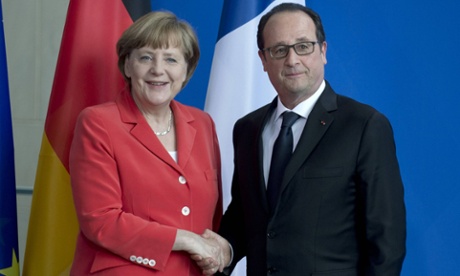
Germany and France have forged a pact to integrate the eurozone without reopening the EU’s treaties, in a blow to David Cameron’s referendum campaign.
Sidestepping Britain’s demands to renegotiate the Lisbon treaty and Britain’s place in the EU, the German chancellor, Angela Merkel, and the French president, François Hollande, have sealed an agreement aimed at fashioning a tighter political union among the single-currency countries while operating within the confines of the existing treaty.
The Franco-German proposals are to be put to an EU summit in Brussels next month, where Cameron is also to unveil his shopping list of changes needed if he is to win support for keeping Britain in the EU.
The Franco-German accord, disclosed by Le Monde newspaper, calls for eurozone reforms in four areas “developed in the framework of the current treaties in the years ahead”.
Cameron has persistently called for a reopening of the treaties to enable the eurozone to integrate more closely while providing the British with a chance to reshape the UK’s relations with the EU and repatriate powers from Brussels.
EU members and senior officials in Brussels have repeatedly voiced their reluctance to reopen the Lisbon treaty – the EU’s fundamental constitutional document. The Franco-German initiative, likely to be endorsed by the 25 June summit, would definitively close the door on treaty renegotiation.
The move from Berlin and Paris came as the UK prime minister prepared to open his negotiations with the French and the Germans on Thursday and Friday.
Cameron faces a busy week on the referendum campaign. On Monday evening, he hosted the European commission president, Jean-Claude Juncker, at Chequers – kicking off a charm offensive in which he will visit five European leaders.
A Downing Street spokesperson said that Cameron gave Juncker a tour of the house and gardens before they dined on a spring salad, followed by pork belly and vegetables and a dessert of lime bavarois.
“The prime minister underlined that the British people are not happy with the status quo and believe that the EU needs to change in order to better address their concerns,” said the spokesperson.
“Mr Juncker reiterated that he wanted to find a fair deal for the UK and would seek to help. They talked through the issue at some length in the spirit of finding solutions to these problems. They agreed that more discussion would be needed, including with other leaders, on the best way forward.”
The former prime minister of Luxembourg will play a subsidiary, if influential, role in the negotiations whose outcome will ultimately be decided by national government leaders.
On Thursday, a day after the state opening of parliament, Cameron will fly around Europe to meet the Danish prime minister, Helle Thorning-Schmidt, in Copenhagen, the Dutch prime minister, Mark Rutte, in the Hague and Hollande in Paris. The following day he will meet the Polish prime minister, Ewa Kopacz, in Warsaw before going to Berlin to see Merkel. He aims to speak to all other leaders of member states before the June summit.
The Franco-German pact, agreed as the Greek debt crisis comes to a head, was finalised last week on the fringes of the EU summit in Latvia and sent to Juncker at the weekend, Le Monde reported.
The summit in Riga last Friday was Cameron’s first opportunity since re-election to present his ideas to fellow EU leaders. But it appeared that Merkel and Hollande had bigger fish to fry.
Juncker is preparing policy options for the June summit on how to integrate the eurozone fiscally and politically as it struggles to emerge from more than five years of crisis. The Franco-German proposals are likely to settle the direction of policy. They talk of economic, fiscal and social convergence, combining German insistence on monetary stability with French demands for greater investment.
“Additional steps are necessary to examine the political and institutional framework, common instruments and the legal basis” (of the eurozone) by the end of next year, said the document, according to Le Monde.
The following year, 2017, Germany and France have general elections, narrowing the scope for negotiations with Britain.
The Franco-German policy proposal, said Le Monde, “shows that French and German leaders do not have much in common with David Cameron”.
Cameron and Juncker have not had an easy relationship. The UK prime minister opposed Juncker’s appointment as European commission president. After other EU leaders voted overwhelmingly in Juncker’s favour in June last year, Cameron described their decision as a “serious mistake” and a “backroom deal”.
The promise of an in/out referendum on Britain’s membership of the EU before the end of 2017 was a key element of the Conservative party’s general election manifesto. Cameron has promised to secure a better deal for the UK in the EU before campaigning for Britain’s continued membership.
The EU referendum bill, which will be announced after the Queen’s speech on Wednesday, will make clear that the people eligible to vote will be the same as in general elections, that is adults from the age of 18, Irish and Commonwealth citizens resident in the UK, and British citizens who have lived abroad for less than 15 years.
Downing Street said they did not comment on leaks, but pointed to a statement made by Cameron as he kicked off his timetable for renegotiation at the Eastern Partnership summit in Riga last Friday.
“There will be ups and downs – you’ll hear one day this is possible, the next day something else is impossible,” he said.
“But one thing throughout all of this will be constant and that is my determination to deliver for the British people a reform of the European Union so they get a proper choice in that referendum we hold: an in/out referendum before the end of 2017, that will be constant.”

